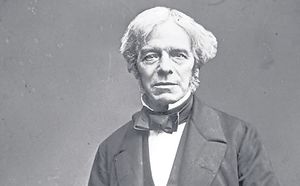‘Let no one suppose for a moment that the self-education I am about to commend in respect of the things of this life, extends to any consideration of the hope set before us, as if any by reasoning could find out God.’
‘Very few men’, said Sir William Bragg, ‘have changed the face of the world as Faraday has done. He was one of the greatest experimental philosophers that ever appeared … and of his discoveries none has had more consequences than that which he made in 1831 … on this has been founded all those applications of electricity which form the muscles and nerves of our modern life’.
Michael Faraday had a humble start in life. His father was a village blacksmith who migrated to London in search of a living wage. Michael was the third child in the family and was born in rented rooms in London’s Elephant and Castle district in 1791.
He grew up in a poor, overcrowded home above a coach-house, receiving the slenderest education, and spending most of his early boyhood playing in the street.







